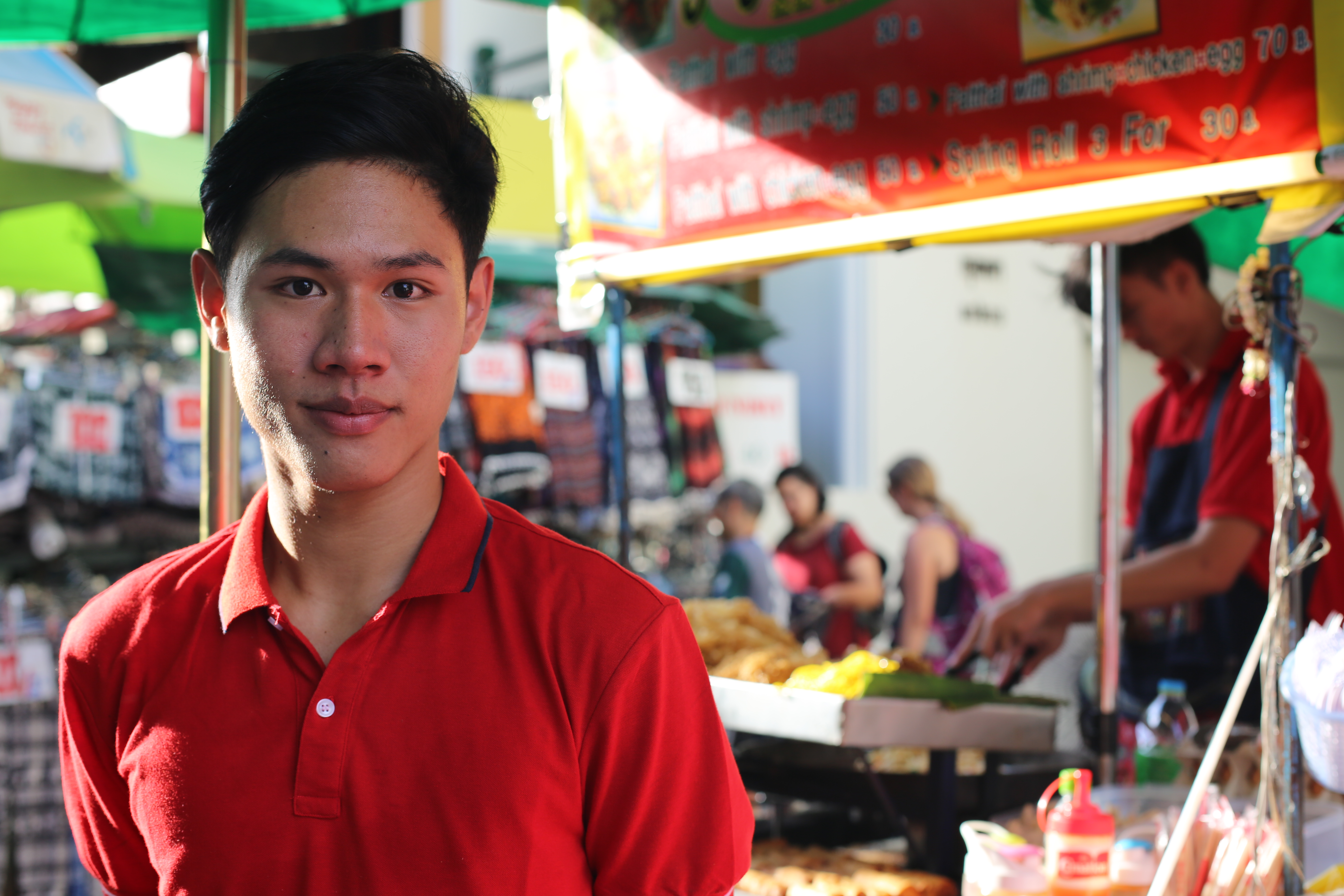The Bangkok Metropolitan Administration (BMA) is taking a fast and furious approach in their race to wipe street food vendors from Bangkok’s sidewalks by the end of the year.
As we reported yesterday, the BMA plans to move toward making restrictions on street food vendors in the famed street-eating districts of Khaosan and Yaowarat. This follows a ban on street food in Thong Lor, Ekkamai, and Phra Khanong in a law that became official on Monday.
Coconuts headed out to Khaosan to seek thoughts and comments from the vendors working there.
Most of the vendors were uncertain about what would happen. Some had been told their district would be excluded from the ban, others heard they might be restricted to a certain section of the street, much like a hawker center or outdoor food court.
Some of them had given up other jobs to run their own stalls in the backpacker mecca and did not relish the idea of having to job hunt again if they were kicked out.
Sam, 19, is originally from the northern province of Payao. He manages the stall he works at, JoJo Pad Thai, which operates almost around the clock and has five employees that mostly hail from Myanmar. He worries what might become of them if they could no longer work at a city food stall.

“This is the signature of Thailand — street food,” he said of the ongoing crackdown. “I think if they get rid of the shops, it’ll be unfortunate, and we’ll have to change to another place. If they have to do that, maybe we gotta give in. It is sad.”
“CNN identified Thailand as the best street food destination, and Khaosan Road is one of the most popular places in Thailand. I’m not sure what’s gonna happen, but I’ll just keep doing my best and selling pad thai.”
Somdet and Sakhon Jitlaem, a couple in their 40s from Khon Kaen, have been selling pad thai at the corner of Khaosan for about a year. Sakhon, the wife, used to work in a factory before the couple decided to invest their money in coming to the city to open the stall. She told Coconuts that she much prefers running the stall with her husband to working in a factory. She was dismayed to hear that the government might limit the zone where food can be sold or remove the vendors altogether.
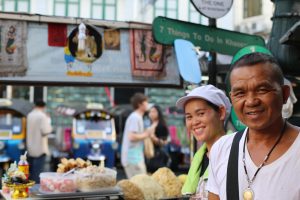
Like most street-food vendors, the couple pays monthly rent to the owner of the land their shop sits on to keep their cart there. Indeed, all street food vendors pay monthly fees to someone, be it rent to a land or shop owner where they sell their food, bribes to local authorities or fees to informal neighborhood organizations.
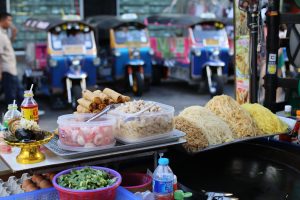
Asked if they believed that Khaosan will be the next location where street food is banned, the couple said they didn’t believe it.
“It’s impossible. How could they not let us sell here?” Somdet asked.
“If they could do it, they would have done it a long time ago,” Sakhon added as she shredded carrots.
But while adamant it couldn’t happen to them, both described a bleak future should their streetside shop be shuttered.
“We’ll be unemployed. We will lose our income. Back when we first opened the shop, we didn’t know anything about the sidewalk cleanup. We haven’t really thought about what to do [if we had to close the shop].”
Jirat Jarukijpaisarn, 40, has been working on Khaosan for 20 years now. In the early days, she just sold postcards on the street. Today, she has her own cell phone accessory stall, selling items such as cords, earbuds, power banks and phone cases.

Although she won’t be directly affected by the ban, she is friendly with most people on the street and lets a few food sellers set up in front of her shop. It makes sense, she says. While a customer stands there and waits for their somtam, they might take a look and buy something at her shop.
About the street food ban, she said, “You can organize and limit the zone, but you cannot just tell people to give up their jobs. These people have families to provide for, and selling has been their job for a long time, and they wouldn’t know what to do.”
She believes that if the food vendors get the boot, “No one will come here. Everyone knows Khaosan has everything. They can stay at hotels and shop here. If there were no shops, the street would be very quiet.”
Jidapa Tiansawang, advisor to the president of The Association of Khaosan Road Vendors, has the distinct bragging right of having been born on Khaosan Road. She pointed out the nondescript building behind the police station where she entered the world.

She has been selling T-shirts on Khaosan for 19 years, and swears that the government won’t be able to change life on the tourist street.
“No, they won’t clean up the sidewalk. Khaosan and Yaowarat Roads will be exempt, but they might ‘organize’ the vendors,” Jidapa said.
She mentioned that a scheme to relocate street vendors in another Bangkok district had failed as those vendors were now hidden away in a rarely visited area.
“Khaosan Road is the signature of Bangkok. I think the day [the government bans street vendors] will never come. I believe that tourists also won’t be okay with this.”
Saiyon Panya, 56, is a longtime somtam seller that moved her cart to Khaosan from Tha Prachan in October after the government decided to ban street food vendors in that district, just in front of Thammasat University.
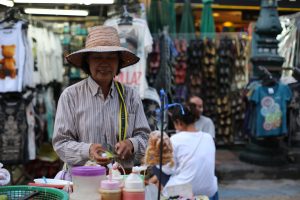
Saiyon has been the main breadwinner in her family since her husband had a stroke, leaving the right side of his body paralyzed.
After she was evicted from the popular university area, where she made about THB700 (USD20) in profits per day, she looked for a new place to park her somtam cart on Khaosan. Though some stall owners were rude, she found a home in front of Jirat’s mobile accessory shop, where the kind vendor was happy to coexist with the displaced salad maker. She doesn’t get many customers in her new home though and only makes about THB300-400 (about USD10) per day now.
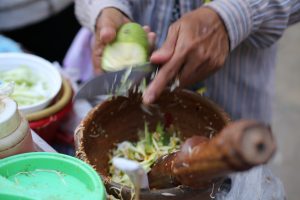
Saiyon said that if she can’t sell somtam, her family will starve. “My husband is disabled, and he’s lying at home waiting for me. If I don’t go out [to sell somtam], we won’t have food on the table.”
“I can only pray for my knight in shining armor to help me out,” she said. “I can only pray that one day I can go back to Tha Prachan,” she said, hoping that some government officials will undo the chaos they have created in the lives of longtime food vendors around the city.
Additional reporting by Prae Sakaowan
